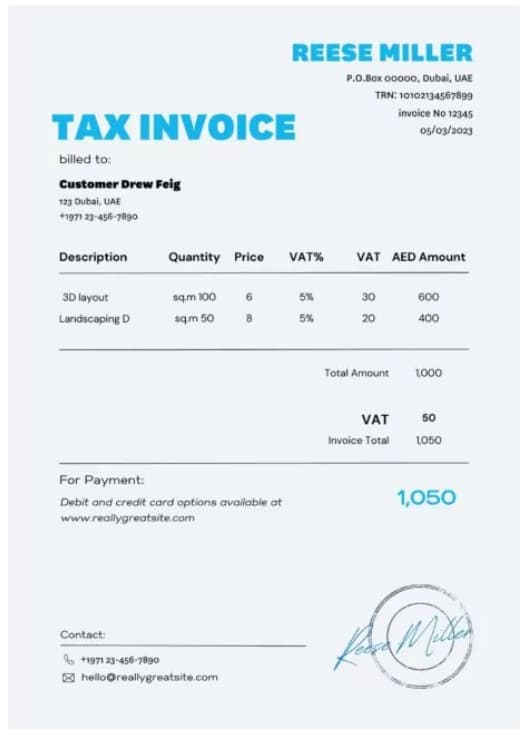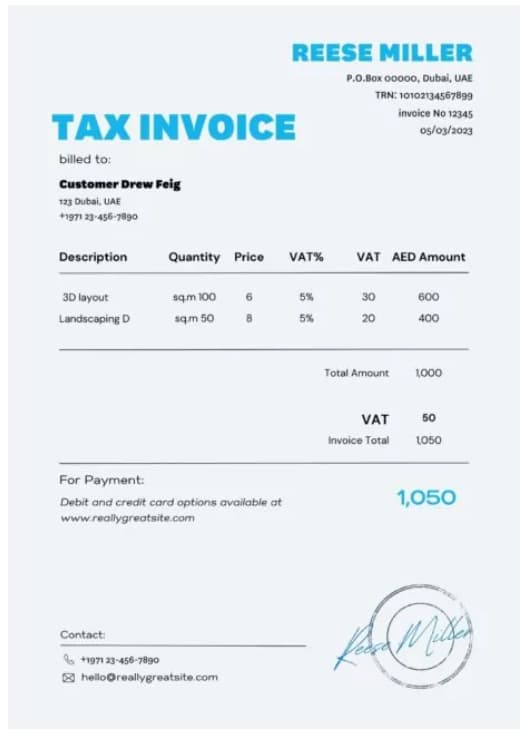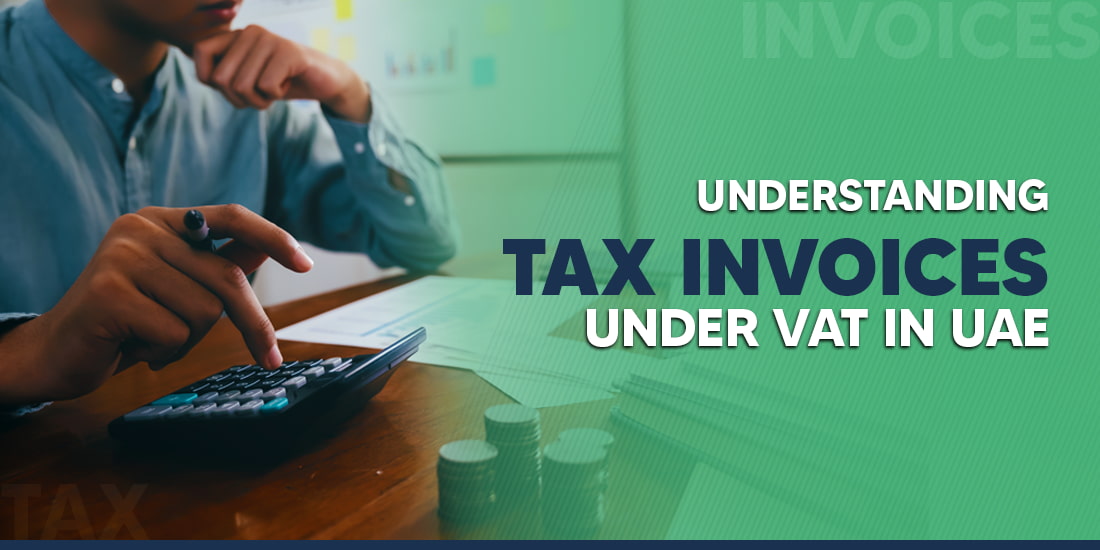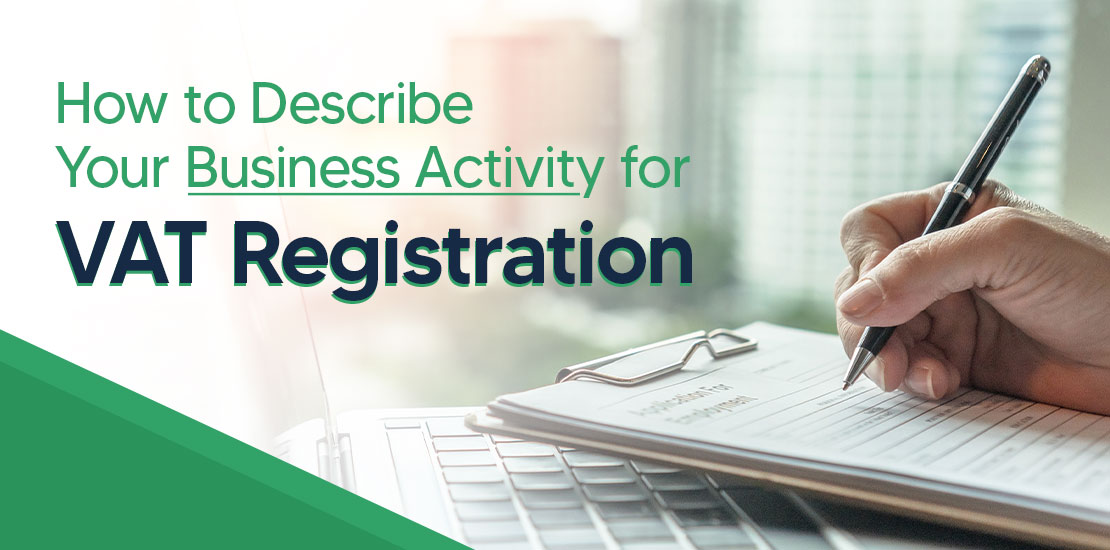The Tax invoice in Dubai is important for businesses and tax authorities. It serves as a clear record of transactions. It ensures that VAT regulations are followed and makes it easier to manage tax payments. A well-prepared tax invoice not only helps in claiming VAT refunds but also keeps your financial records organised and transparent.
Understanding the key elements to include on a tax invoice, such as VAT amounts and business details. It can simplify your accounting processes and reduce the risk of errors. By mastering the format and requirements of a tax invoice, businesses can move the VAT system smoothly and maintain smooth operations.
What is Tax Invoice in UAE?
A tax invoice in UAE is a formal document issued by a seller to a buyer that details the goods or services provided and the amount of Value Added Tax (VAT) charged. It serves several essential functions:
- Record-Keeping: It provides a detailed transaction record, including the date, description of items or services, quantity, price, and VAT amount.
- VAT Compliance: It ensures that the VAT charged is documented correctly, helping the seller and buyer comply with tax regulations.
- Tax Refunds: For businesses, a tax invoice is essential for claiming VAT refunds or credits, as it acts as proof of the tax paid.
- Financial Transparency: It aids in maintaining transparent financial records for both parties involved, which is crucial for audits and financial reporting.
In essence, a tax invoice is a key component of VAT administration, helping businesses manage their tax obligations and maintain accurate financial records.
When should you issue a tax invoice in Dubai?
A tax invoice in the UAE must be issued in the following situations:
- When Goods or Services Are Supplied: A tax invoice should be issued when a sale of goods or services occurs. This applies to both B2B (business-to-business) and B2C (business-to-consumer) transactions.
- Within 14 Days: The invoice must be issued within 14 days of the date the goods or services are supplied. This ensures timely documentation of the transaction for VAT purposes.
- Upon Request: If a customer requests a tax invoice, it should be provided promptly, even if the transaction occurred earlier.
- For Payments Received in Advance: If a business receives payment before supplying the goods or services, a tax invoice should be issued at the time of receipt.
Issuing a tax invoice in these scenarios ensures compliance with VAT regulations and helps businesses and customers manage their tax obligations effectively.
Who Must Issue a Tax Invoice?
In the UAE VAT system, the seller typically issues a tax invoice, but there are exceptions where the buyer or an agent may take on this task.
- Seller: Typically, the supplier of goods or services is responsible for issuing the tax invoice. However, in some cases, the buyer or an agent may issue it.
- Buyer: If it’s easier for the buyer to identify the details of the goods, they can issue the tax invoice, provided the seller agrees in writing not to issue it.
- Timing: A tax invoice must be issued within 14 calendar days of the supply date.
- Agent: An agent selling on behalf of a supplier can issue the tax invoice, including their details and the principal supplier’s information.
- Summary Invoice: A single tax invoice can be issued for multiple supplies to the same buyer within a month.
Mandatory Fields in a Tax Invoice
Here’s a table outlining the mandatory fields to be mentioned in a tax invoice according to VAT law:
| Mandatory Field | Description |
| Tax Invoice | The words “Tax Invoice” prominently displayed |
| Supplier Information | Name, TRN, and address of the supplier |
| Recipient Information | Name, TRN, and address of the recipient |
| Unique Identifier | A unique or sequential identifying number |
| Invoice Date | The date when the invoice is issued |
| Date of Supply | The date when the supply occurred (if different from the invoice date) |
| Description of Goods/Services | Details of the goods or services supplied |
| Unit Price, Quantity, Tax Rate, Amount | Unit price, quantity supplied, tax rate, and total amount payable |
| Discounts Offered | Any discounts applied to the invoice |
| Gross Value Payable | Total amount payable before VAT |
| VAT Amount Payable | The VAT amount payable |
| Reverse Charge Declaration | Declaration of reverse charge if applicable |
Types of Tax Invoices in the UAE
There are two types of tax invoices in the UAE: full tax invoice and simplified tax invoice.
- Full Tax Invoice: Required for most transactions and includes detailed information.
- Simplified Tax Invoice: A simplified tax invoice is a shorter version of a standard one, requiring fewer details.
Full Tax Invoice

A valid full tax invoice must include:
- The words “Tax Invoice” clearly displayed
- Seller’s name, TRN, and address (P.O. Box at minimum)
- Buyer’s name, address, and TRN (if VAT registered)
- A sequential or unique tax invoice number
- The date of issuing the invoice
- The supply date (if different from the invoice date)
- Description of goods or services supplied
- For each item, the unit price, quantity, VAT rate, and amount payable (in AED)
- Any discounts offered
- The gross amount payable (in AED)
- The VAT amount payable (in AED) and exchange rate if invoiced in foreign currency
- If the buyer must account for VAT (e.g., reverse charge), a statement noting this and referencing the relevant law provision
Simplified Tax Invoice in UAE

It can be issued in two situations
- The recipient is not VAT-registered in UAE.
- The recipient is VAT-registered, but the transaction is below AED 10,000.
Simplified tax invoices are typically issued to end consumers or small business transactions under AED 10,000.
Mandatory Fields in a Simplified Tax Invoice
A simplified tax invoice in the UAE must include the following details:
- The words “Tax Invoice” prominently displayed
- Name, TRN, and address of the supplier
- Date of the invoice
- Description of the goods or services
- Total amount payable
- Total VAT payable
Read more: Tax Invoice Format UAE
Simplify your Taxation with Shuraa
In Dubai, tax invoices are vital for businesses and tax authorities. They provide a clear record of transactions and ensure VAT compliance. They help manage tax payments, claim VAT refunds, and maintain organised and transparent financial records. Understanding and including key elements like VAT amounts and business details on a tax invoice can simplify accounting processes and reduce errors.
Businesses can turn to Shuraa Tax for expert assistance with VAT compliance, ensuring smooth operations within the VAT system. Call +971 50 891 2062 or email us at info@shuraatax.com today.













